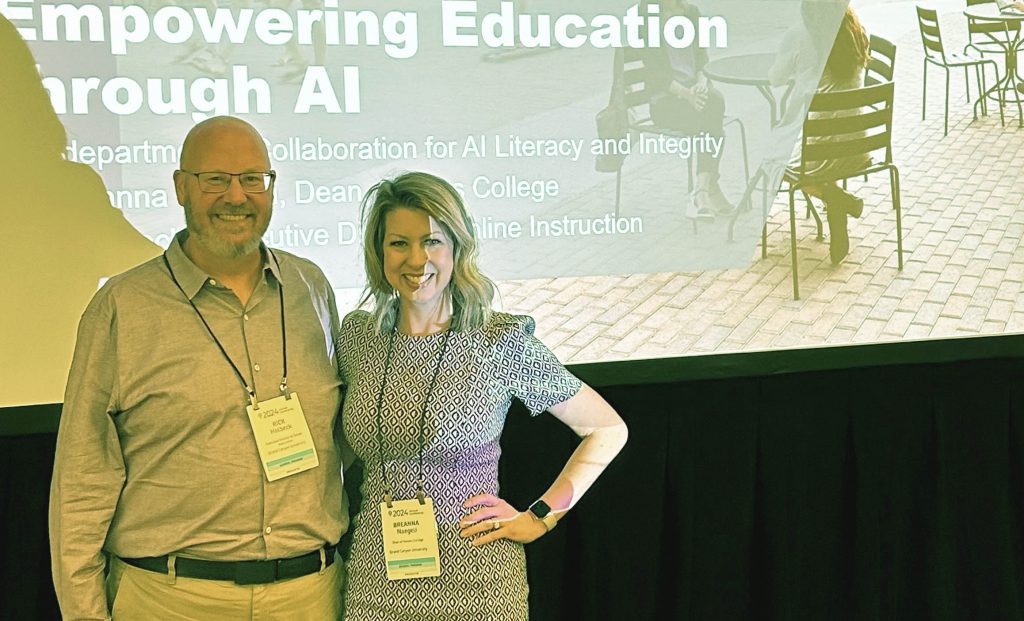
When Higher Learning Commission Annual Conference first-timer Rick Holbeck stepped into the room where he was invited to present a talk, he was floored at the size of the space.
“They chose HUGE rooms for us – like ballrooms,” said Grand Canyon University’s executive director of online instruction. He was there to lead a discussion alongside Honors College Dean Dr. Breanna Naegeli about how GCU is approaching artificial intelligence. “I was shocked. I thought, no one’s going to come to this.”
But they did.
“The rooms were packed,” Holbeck said. Each was big enough to accommodate an estimated 400 spectators at the April gathering, an event in Chicago attended by thousands of academics from colleges and universities across the country.
What surprised him just as much at the size of the room was how engaged the audience was, directing question after question to the GCU academic leaders during and after the presentation.
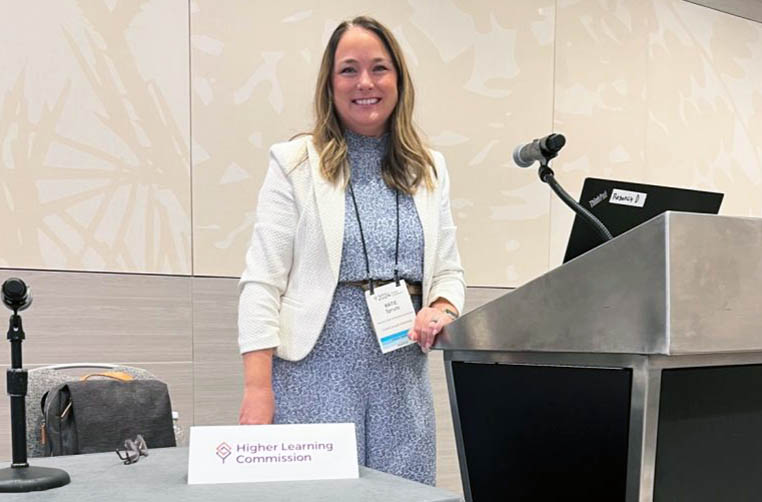
“We had lines of people coming up to talk to us about what we were doing and even emails afterward of, ‘You guys are leaders. I’d love to pick your brain about this.’ We were asked to do a podcast in the future for another university ...
“We felt like rock stars," Holbeck said.
And he and Naegeli weren’t the only GCU-based rock stars invited to speak at the conference, known to be notoriously challenging to get invited to as a presenter.
Holbeck helmed a second AI-related discussion with College of Education Dean Dr. Meredith Critchfield, and Katie Sprute, online full-time faculty chair in the College of Education, led her own presentation on how to better engage remote faculty.
"From what I gather, it was a pretty competitive process to present," said Sprute. "I was humbled to have the opportunity to share what GCU and the College of Education is doing."
Added Critchfield, “The enthusiasm around GCU’s presentations at HLC was really special to be a part of and to witness. We talk a lot at GCU about innovation and helping our students change their lives for the better, but to hear dozens of leaders at other institutions tell us that the work we’re doing is a catalyzing force for good was an incredibly powerful experience.”
Provost Dr. Randy Gibb acknowledged the significance of GCU faculty's invitation to speak at the event.
“For a university to get selected to present is always a competitive process, and for multiple presenters to be asked to present on a similar topic, such as AI, is even more significant,” he said of the conference, a gathering of academic movers-and-shakers organized by the HLC, which accredits degree-granting colleges and universities across the United States.
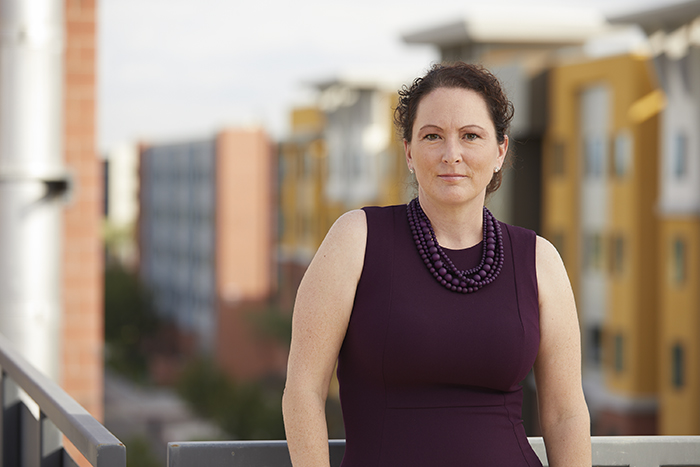
Vice Provost Dr. Jennifer Lech, who attends the HLC conference regularly, added that organizers also try not to select talks by one university or college, preferring those presentations to be a cross-collaboration of different institutions.
Another differentiator, Gibb said: “Given that more than 300 attendees elected to attend each of our GCU teams’ presentations, and given the 20-30 follow-up comments, questions and emails, the level of interest generated on their information was clear.”
Sprute's talk touched on a relevant topic in higher education – online learning – as more and more universities are growing their online offerings and the use of adjunct faculty. GCU employs more than 800 faculty across the United States.
"So it’s an interesting situation … the idea of trying to foster community with remote faculty when they (might also) have a job somewhere else," Sprute said. "That presents even more of a challenge of reaching them and engaging with them."
GCU faculty presented two other talks, both about AI, which fit in perfectly with the conference’s theme of “Leading International Education at a Crossroads.”
AI is that crossroads for higher education, and it’s something GCU has been preparing for ever since ChatGPT hit the scene in 2022.
“AI has been a prominent topic for academic leadership over the last 18 months,” said Naegeli, who chairs the Character and Integrity Committee, an offshoot of which is the Generative Artificial Intelligence Committee, led by Holbeck. “We have been exceptionally collaborative across various departments at GCU – doing an exceptional amount of work surrounding AI and higher education.”
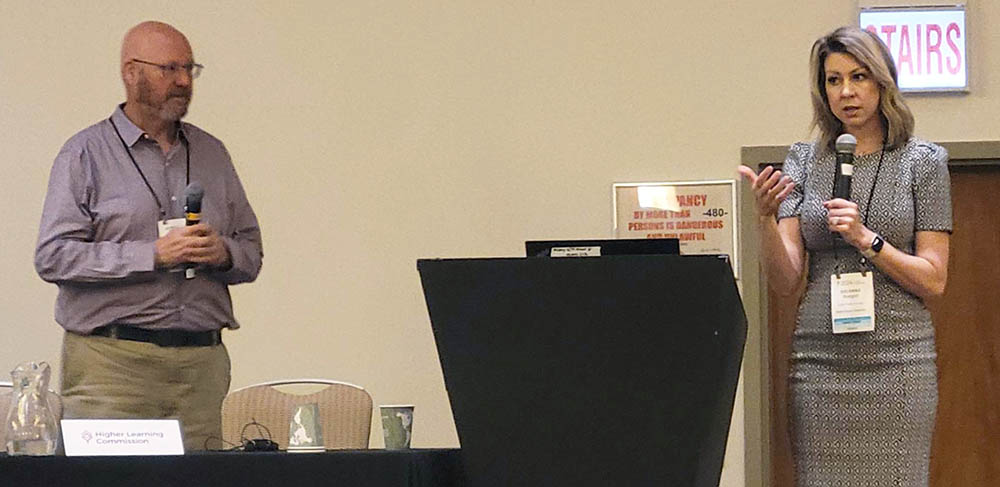
Those committees have raked over everything from integrating AI into the curriculum, to coaching faculty and students through ethical use and conduct with AI.
“Two consistent themes surrounding AI at this conference, just from audience feedback, was the fear that AI would lead to academic dishonesty, and that AI would start replacing jobs, so naturally there was a lot of pushback on it,” said Naegeli, whose HLC conference talk with Holbeck was titled “AI in Education: Boosting Literacy and Integrity Through Collaboration.”
There was also the assumption that students would use AI to cheat – to write poems or papers or solve math problems for them – “and it was going to be the biggest disruptor to the integrity of our academics since the calculator, since Wikipedia and Google searches.”
Collectively, universities have been reactive to AI, banning it on campuses, putting up firewalls to prevent students from accessing the technology, or creating policies and disciplinary action for students who don’t use it ethically.
“For many institutions, they started there, and they finished there,” Naegeli said. “For GCU, we operated similarly in that our first response was, how do we create a statement – a policy? What do we do to set guidelines?”
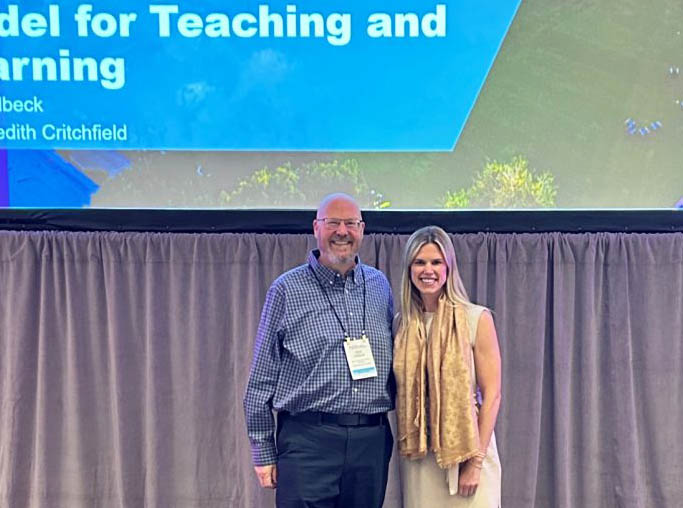
But then, she added, “We said, ‘OK, what’s a more proactive approach, because AI is here to stay, and it’s not just ChatGPT. There’s 200-plus other AI platforms that are emerging every single month for different purposes.”
The question GCU has been answering was not, how do we block AI and prevent students from using it, but how can we best use AI ethically and how can we effectively integrate it into what we do?
Holbeck paired with Critchfield in a presentation about teaching and learning strategies surrounding artificial intelligence. They shared a visual model that shows that the AI conversation doesn’t just live with faculty or administration but with all different departments, from technical support to curriculum development to instructional design.
After the AI Committee was formed at GCU, “One of the first things we did was create a visual model around our mission statements at GCU and just kind of put together a really cool presentation on how we’re going to use AI to help humans flourish,” Holbeck said of the talk, titled “Developing an AI Model for Teaching and Learning.” “… She (Crtichfield) and I just walked through the whole process.”

Added Naegeli, “Our model was content that I think folks sitting in the audience were taking diligent notes on. They were trying to find a way to bring this model and our collaborative approach back to their own institution,” Naegeli said.
In the end, “It’s not all cheating and academic integrity scandals. It’s creating efficiencies … it’s the new way of the future – you have to learn how to use it.”
Holbeck said the big thing he learned at the HLC conference was how much work GCU really has done when it comes to AI.
When the pandemic hit, the University was uniquely prepared to transition to educating students remotely because it has been a leader in online education for so long.
President Brian Mueller has said that what’s next for GCU is to become leaders in AI, from using it to create operational efficiencies within the University’s departments, to integrating it in the most ethical manner possible into the University’s academics.
Holbeck, who was there when the internet first entered K12 education, said of AI, “This seems even bigger. I think of this as maybe when the calculator came around. It’s like that.”
And GCU wants to be at the forefront of that kind of cutting-edge technology.
One reason why so many attendees at the HLC conference lined up to speak to presenters afterward was to gather more information about GCU's virtual LOPE Conference June 6, which will include such talks as "Using AI to Help Students Be Successful Beyond the Classroom" and "Ethical and Societal Implications of Generative AI." More than 900 have registered already, Sprute said of the event, presented by GCU's Department of Online Teaching and Learning.
Holbeck and Naegeli both expressed how GCU is well on its way to realizing that vision of leading the way when it comes to AI.
Other attendees at the conference, who are just finding their bearings after a global pandemic disrupted everything, told them: “We haven’t even thought about this (AI) yet. You guys are way ahead of the game.”
Manager of Internal Communications Lana Sweeten-Shults can be reached at [email protected] or at 602-639-7901.
Related content:
GCU News: AI interns hit the gas on machine learning
GCU News: Virtual reality gym, pirate ship projects a treasure



































































